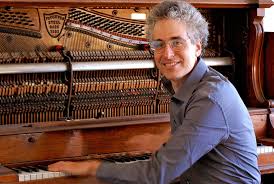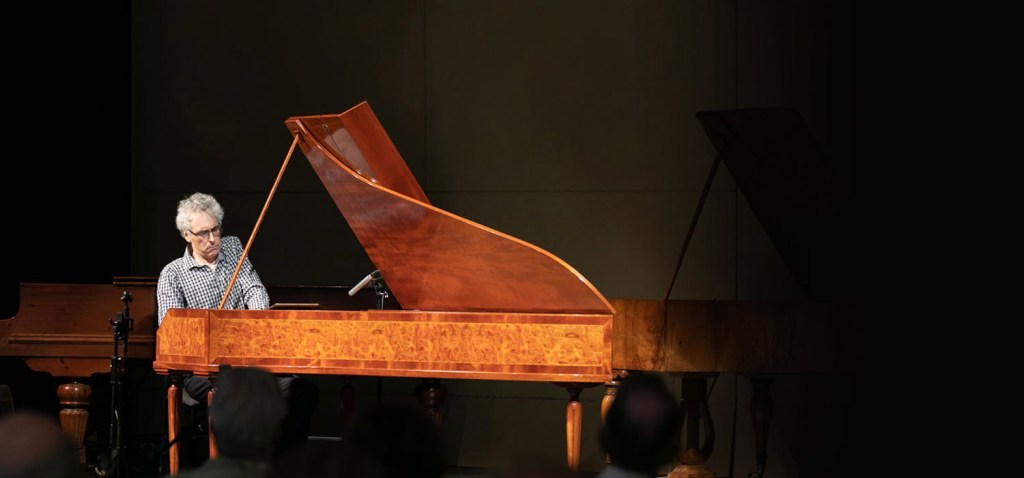We’re concluding our Early Music for Modern Instruments series with an October 24 online workshop with acclaimed pianist, fortepianist, and composer Eric Zivian. To learn more about the secrets of the fortepiano—the predecessor of the modern piano—we reached Eric at the Berkeley home he shares with his professional and life partner, the cellist Tanya Tomkins; and three pianos of different vintages.

What is your musical background? Who were your teachers?
I grew up in Toronto in a family that loved classical music but wasn’t especially “musical,” although a cousin of mine plays piano in the contemporary ensemble Eighth Blackbird. When I was 4, my mother decided she wanted to study piano again, and she took me along to her lessons. I was an early book-reader, and I loved reading music as well—I wanted to sight-read lots of music right away. My first teachers were from the neighborhood—good but not outstanding—but when I was 11 I got a teacher from Latvia who was a great musician and who became a big influence. She got me to take it seriously. I attended Toronto’s Royal Conservatory of Music’s after-school program, and later studied at the Curtis School of Music, the Juilliard School, and the Yale School of Music.
What was your first experience with performing?
It was a recital for the teacher when I was about 11. I was lucky to hit a wrong note on the final chord. It was lucky because I noticed that everyone had liked the performance anyway! As a result, I don’t worry much about mistakes, and I don’t have stage fright.
What sparked your interest in early music and the fortepiano?
I’d always been frustrated with the articulation of the modern piano when I played early music. It seemed a bit soggy at times—too loud, too accented, not as crisp as I’d like. When I listened to Mozart’s Jupiter Symphony performed on period instruments I could hear the difference.
About 20 years ago—I was already over 30—my partner, Tanya, got access to an 1841 Viennese fortepiano through a restorer in Holland. That was when I was finally able to start playing a period instrument of my own. That 1841 instrument is one of three we now have. The others are a modern Steinway grand and a copy of a 1795 fortepiano that’s the size of a harpsichord.
Why does a fortepiano sound different from a modern piano?
Modern pianos have a metal frame, which allows their strings to be strung more tightly. Also, in the mid-19th century, piano makers found they could save space by crossing the bass and treble strings. It was a clever solution, but something was lost in the quality of the sound. On an older instrument, the bass feels very deep and resonant, and the top register is quieter and decays more quickly.
My 1795 instrument has knee pedals. Foot pedals were introduced around 1800. You might think it would be hard for a modern pianist to adjust to knee pedals, but I found it pretty easy.
You perform early music, but you also perform the works of more recent composers such as Ravel and Debussy. And you compose contemporary music. How do old and new complement each other?
When you play early music on period instruments it actually sounds and feels new—you get a sense of how it felt when those instruments were cutting edge. It feels like you’re doing something new and exciting.
For workshop participants who play modern instruments, I recommend listening to early music on period instruments—really hearing the sound. Then go back to your modern instrument and do things differently. Don’t overuse the pedal. Don’t overlook the bass and middle voices. Concentrate not just on the melody but on the clarity and texture of the music you’re playing.
What has changed in your musical life since the pandemic?
Tanya and I had been producing the Valley of the Moon Music Festival in Sonoma every July since 2015, presenting Classical, Romantic, and post-Romantic chamber music on period instruments. Of course that didn’t happen this year, but we’re doing a lot of online presentations. In honor of Beethoven’s 250th birthday this year, I’ve been learning and performing all of the Beethoven sonatas on fortepiano and uploading one each week. I’d hoped to finish by the end of the year, but I had a bit of a setback at the end of July: I had a bike accident and landed on several body parts, including my knuckles. I couldn’t play for a couple of weeks. I’m now seeing a new physical therapist, and I’ve been cleared to play, although I have to avoid overdoing it or my hand swells up.
